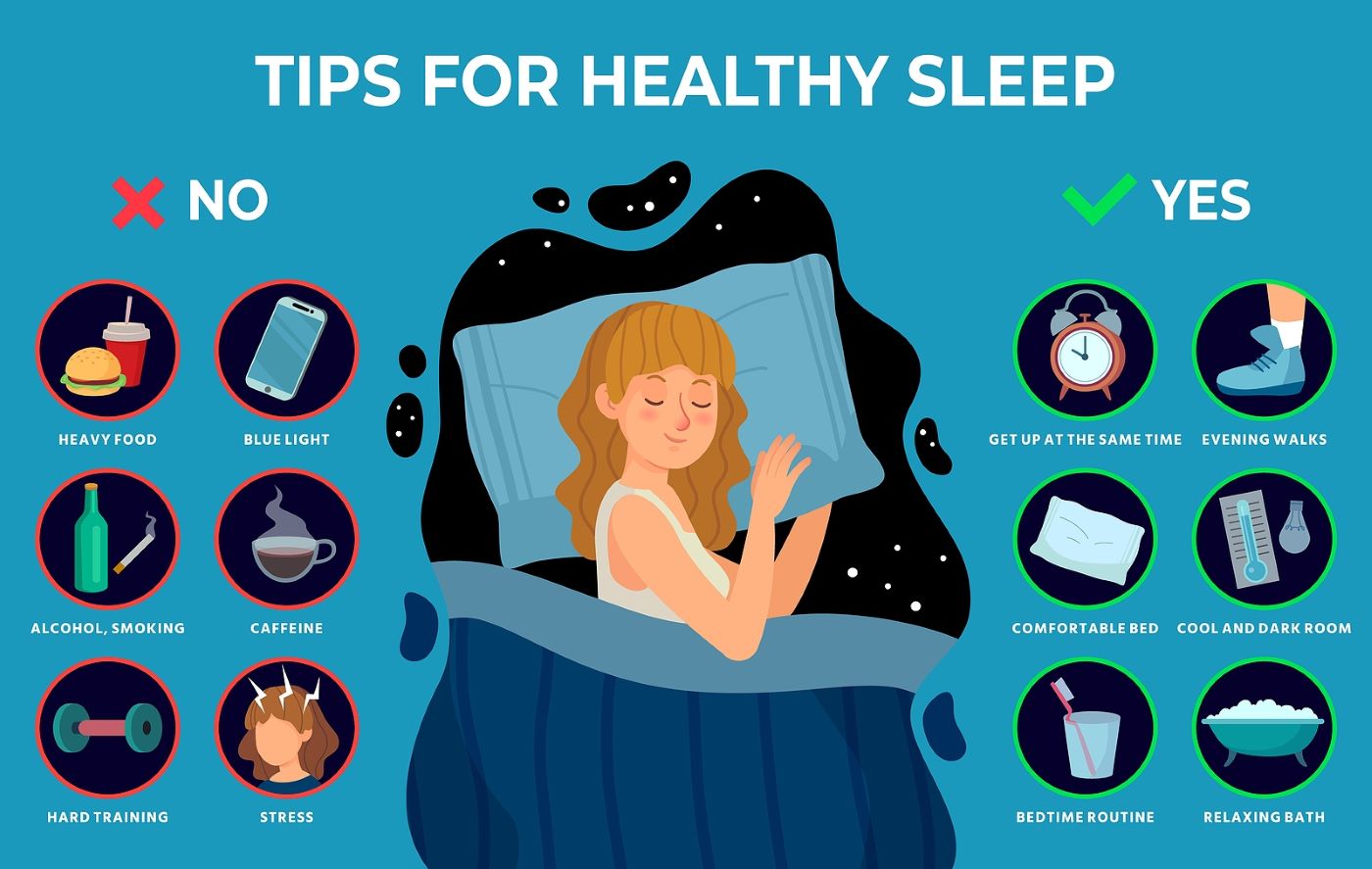How to fall asleep faster and sleep better (7 tips)
Sleep is essential to every process in the body, including:
- Physical and mental functioning the next day
- Ability to fight disease and develop immunity
- Chronic disease risk – e.g. diabetes, high blood pressure and ischaemic heart disease (IHD).
Here goes. 7 tips to sleep better.
- Keep to a sleeping schedule
- Pay attention to what you eat and drink
- Only use your bedroom and bed for sleeping. No screens
- Take a hot bath 90 mins before bed. Read a novel or similar. Nothing heavy
- Limit daytime naps
- Do some exercise in the day. A long walk is fine
- Limit worries
1. Stick to a sleep schedule – especially going to bed on time
The recommended amount of sleep for a healthy adult is variable, depending on age; the older you are, the less sleep you need – with a range of 6-10 hours. So, it is best to set aside about eight hours for sleep. Most people don’t need more than eight hours in bed to be well rested.
Go to bed and get up at roughly the same time every day, including weekends. Being consistent reinforces your body’s sleep-wake cycle.
If you do not fall asleep within about 20 minutes of going to bed, leave your bedroom and do something relaxing. Read or listen to soothing music. Go back to bed when you are tired. Repeat as needed, but continue to maintain your sleep schedule and wake-up time.
2. Pay attention to what you eat and drink
Do not go to bed hungry or stuffed. In particular, avoid heavy or large meals within a couple of hours of bedtime. Discomfort may keep you up.
Nicotine, caffeine (especially coffee) and alcohol deserve caution, too. The stimulating effects of nicotine and caffeine take hours to wear off and interfere with sleep.
Although alcohol may help you fall asleep quickly, it hinders sleep quality, often causing fragmented (interrupted) sleep. When consuming alcohol, it is recommended to do so several hours before bedtime; so most of the alcohol is out of the system before sleep.
3. Only use your bedroom and bed for sleeping – and create a restful environment. No (no) screens
Refrain from using your bed to watch TV, pay bills, or work. So when you go to bed your body knows it is time to sleep. Sex is the only exception.
Keep your room cool, dark and quiet. Consider using a room-darkening eye mask, earplugs, a fan or other devices, to create an environment that suits your needs.
Doing calming activities before bedtime, such as taking a bath or using relaxation techniques, will also promote better sleep. The important thing is to have a routine, i.e. have a bath every night, if its part of your regime.
Avoid prolonged use of light-emitting screens (mobiles, laptops) just before bedtime. Reading a novel, just before or in bed, is better.

4. Take a hot bath 90 minutes before bedtime
A hot bath will raise your body temperature, but it is the drop in body temperature that may leave you feeling sleepy.
5. Limit daytime naps
Long daytime naps can interfere with night-time sleep. Limit naps to no more than one hour and avoid napping late in the day.
However, if you work nights, you might need to nap late in the day before work to help make up your sleep debt.
6. Include physical activity in your daily routine
Regular physical activity can promote better sleep. It can tire you out. Spending time outside every day is also helpful.
7. Manage worries
Try to resolve your worries or concerns before bedtime. Jot down what’s on your mind, and then set it aside for tomorrow.
Does screen time affect sleep?
There is evidence to show that screen use right before bed impacts sleep. One reason is that the blue light emitted from these devices can affect the secretion of melatonin. This is the hormone that signals to the body that it is time to fall asleep.
Other reasons include the content of what is on the screen. For example, if you watch a scary movie, read an emotionally-driven article, it can affect your ability to fall asleep. CKDEx recommends putting away all screens at least one hour before bed and to instead do some light reading.
Referral to Sleep Clinic
If natural sleep methods like these do now work most of the time, it is worth discussing your sleep problems with your GP. If your GP cannot sort it it, ask them to refer you to a Sleep Clinic at your local hospital. You will see a senior doctor there, either a consultant (boss) or their deputy called a registrar.
Summary
We have given you 7 tips to fall asleep faster and sleep better. If you follow the advice above, you will sleep better and feel better the next day.

